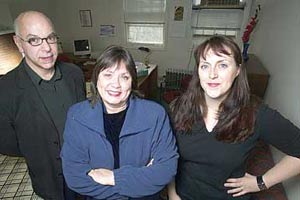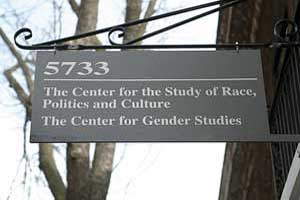Center for Gender Studies provides an informal place for discussion, scholarship
By Seth SandersNews Office
 Stuart Michaels (left to right), Assistant Director for curriculum and development, Rebecca West, Director, and Gina Olson, Assistant Director for programming and administration, share the responsibilities of operating the Center for Gender Studies |
An Italian peasant and his dullard son go on a long, strange journey, and after much difficulty and at the end of their rope, they meet a magical talking crow. The crow gives a visionary oration in which he inventories urgent fears about the future of mankind: the death of Marxism, the end of humanism and a coming apocalypse. The peasants, bored with the crow’s bloviations and very hungry, eat him.
The topic under discussion is “Apocalypticism and Homosexuality in the Late Scripts of Pier Paolo Pasolini,” and the event is one of many Brown Bag lunches and lectures presented by the Center for Gender Studies.
Maggi, Associate Professor in Romance Languages & Literatures and the College, explains how the crow, voiced by Pasolini himself in the film, parodies and embodies the Italian writer and director’s own vision.
Pasolini, a man who wrote poems about the Catholic Church and whose first major film was The Gospel of St. Matthew, was well known for his blasphemies. A gay man living in repressed Italy after World War II, Pasolini assimilated the Church’s position to himself, viewing himself as an inhabitant of Sodom. His bold philosophical move was to universalize this position into a new vision of human history. “In our fallen condition we are all Sodomites, and the shape of our history is that of a suspended apocalypse,” says Maggi, explaining Pasolini’s view.
It is difficult to imagine a place where one could easily learn about subjects like this, let alone discuss them in-depth, because such a place has not always existed. The Center for Gender Studies was founded in 1996 and relocated this year from Judd Hall to its new offices at 5733 University Ave.
This past Valentine’s Day, Martha Roth, Professor in the Oriental Institute and the College, presented a paper on marriage, divorce and prostitution in ancient Mesopotamia. On Wednesday, May 21, Wendy Doniger, the Mircea Eliade Distinguished Service Professor in the Divinity School, will present the 2003 Distinguished Faculty Lecture on the topic, “The Third Nature in the Kamasutra: the Asymmetry of Male and Female Homoeroticism.”
In the crowded room, Maggi continues to explain Pasolini’s ambitions, to unite his interpretations of the Bible and Marx in a film, Porno-teo Colosso, or “big theological porn.” But this theo-sexual blockbuster was never filmed and is unknown to many scholars familiar with Pasolini, including Rebecca West, who is sitting and discussing the script along with a number of interested students and scholars from various departments across the University.
 |
She describes the center as a place that existed virtually before it finally materialized. Early members of a loose-knit group of faculty who were studying and teaching about gender included West; Leora Auslander, Associate Professor in History and the College; Lauren Berlant, Professor in English Language & Literature and the College; Elizabeth Helsinger, Chair and the John Matthews Manly Distinguished Service Professor of English Language & Literature and the College; Norma Field, the Robert S. Ingersoll Professor in Japanese Studies; Susan Gal, Professor in Anthropology and Linguistics and the College; and Beth Povinelli, Professor in Anthropology and the College.
Stuart Michaels, a key member of the gay and lesbian studies workshop in the early 1990s, is now Assistant Director for curriculum and development at the Center for Gender Studies. Gina Olson, Assistant Director for programming and administration at the center, plans and organizes a wide range of events, including the Brown Bag lunches.
The center, which includes an active Gay and Lesbian Studies project directed by George Chauncey, Professor in History and the College, has come a long way since its beginning, says Michaels. It now offers fellowships, visiting scholarships, and regular workshops and meetings. But its mission to encourage discussion of how gender and sexuality connect to other political and intellectual concerns remains the same, as does its informal atmosphere.
Nearly all of the Brown Bag lunches draw a full audience, and a wide range of students, faculty members and researchers, from Political Science to the Pritzker School of Medicine, bring along a different crowd every week. “People are starting to know about us,” says Michaels.
The center is planning a conference for the upcoming Fall Quarter on the topic, “Generations of Feminism,” at which distinguished University alumnae spanning the history of the feminist movement will lecture.
A spring symposium on Pedagogy and the Teaching of Gender Studies will highlight one of the center’s strengths–a devotion to teaching that extends into its working methods. “All of our core courses are co-taught by a professor and a graduate student,” explains Michaels. “And whenever possible we pair a team from both the Humanities and Social Sciences.” Outside of Gender Studies that may happen, but not always with the consistency you see here.
And, adds West, “We’re pretty social, and we have good food.”
The Center for Gender Studies is now located at 5733 S. University Ave.; its social hours are from 5 to 6:30 p.m. on the third Thursday of every month. All of its activities, along with a complete list of scholars, fellows, projects and courses are described at humanities.uchicago.edu/orgs/cgs.
![[Chronicle]](/images/sidebar_header_oct06.gif)